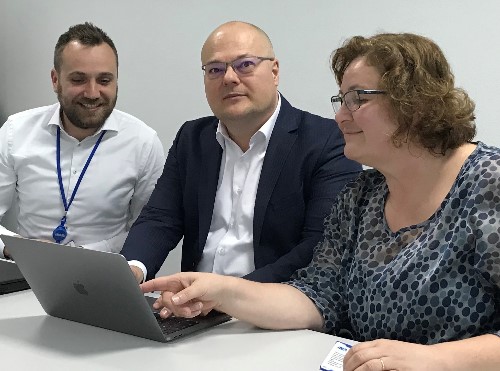Oil & Gas
Saying ‘Yes’ to Business Process Automation
April 24, 2019 | Written by: Matija Svetec, Vesna Mesar, and Zoran Kranjec
Share this post:
 Despite popular belief, technological progress has always been supported and enhanced by the collaboration between humans and machines working together. Digitalization is not only about transferring data into an electronic form, but also about using these forms and finding new ways of developing them. Innovation in technology helps us to come up with new ideas, reach a wider audience, use special tools for organizing and managing work, but above all, create a better product.
Despite popular belief, technological progress has always been supported and enhanced by the collaboration between humans and machines working together. Digitalization is not only about transferring data into an electronic form, but also about using these forms and finding new ways of developing them. Innovation in technology helps us to come up with new ideas, reach a wider audience, use special tools for organizing and managing work, but above all, create a better product.
At INA Group our IT environment is made up of a large range of technical solutions and the real challenge was to decide which new IT solution to choose in order to improve our businesses. To continue to hold our strong position as a leader in Croatia’s oil and gas exploration and production, we knew we needed to further enhance our understanding and strength with tools such as intelligent automation.
We decided to start our digital transformation with a Robotic Processing Automation (RPA) implementation. RPA is an application of technology, governed by business logic and structured inputs, aimed at automating business processes. We found opportunities for application of RPA technology in our finance department where we have a large number of data and services. We chose to start our digital transformation in two of our most important business units — Top Računovodstvo Servisi, which focuses on accounting services and Plavi tim, which provides IT services, including IT systems and infrastructure management to INA Group companies.
IBM and INA Group have a long-term partnership, which began in 2005 when INA transformed its business onto SAP platforms. Since then we have had good and fruitful collaboration, which was an important reason we decided to have IBM as a partner in the implementation of RPA technology.

Matija Svetec, Expert for GL & Reporting, TRS, INA Group: Zoran Kranjec, Business Development Executive, IBM CEE; and Vesna Mesar, ERP Process Management Expert, Plavi Tim, INA Group.
IBM helped us determine which process areas were the best targets for RPA by identifying successful targets based on work that was manual, repetitive, high volume and low complexity. RPA experience provided the foundational automation knowledge and skills we need to begin our journey to scale our automation with RPA and leverage Artificial Intelligence and Machine Learning in the future. After 1,5 year we have over 60 unique robot codes for 42 RPA business processes resulting in time and cost savings, improved process security, data quality and a decrease in fraud.
On average we have achieved 90 percent of planned efficiency, but the most important is that we built the foundation for scaling up to automation with robots. To achieve full planned savings, we would need to change process owner procedures, adjust existing applications and make other customizations.
Digital Transformation is about uncovering new data sets and turning it into actionable insights enabling new ways to get work done. Innovation in technology helps us to come up with new ideas, reach a wider audience, use specialized tools for organizing and managing work, but above all, creating better products and experiences for our clients and employee.

Expert for GL & Reporting, TRS, INA Group

ERP Process Management Expert, Plavi Tim, INA Group

Business Development Executive, IBM CEE
Watson Anywhere: The Future
(Part 3 in a Series) There’s a paradox in the world of AI: While it’s the largest economic opportunity of our lifetime (estimated to contribute $16 trillion to GDP by 2030), enterprise adoption of AI was less than 4% in 2018. A recent Gartner survey said that the 4% in 2018 has now grown to […]
IBM Watson: Reflections and Projections
(Part 1 in a Series) AI has gone through many cycles since we first coined the term “machine learning” in 1959. Our latest resurgence began in 2011 when we put Watson on national television to play Jeopardy! against humans. This became a cornerstone event, demonstrating that we had something unique. And we saw early success, putting […]
Building Data Science Strength from Within
Filling gaps in portfolios, improving upon products and making them not just whole, but advanced, is part of most organizations’ business regimen. It’s the kind of work, the kind of commitment to constant reflection and improvement that separates the successful from the not-so-successful. This philosophy transcends to people, as well. If a gap exists in […]


